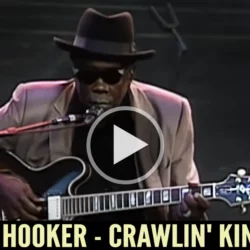Ryland Peter “Ry” Cooder
Ry Cooder is, without doubt, one of the most iconic bluesmen of the 20th Century, and that’s largely thanks to his distinctive slide guitar technique. He has worked with music legends such as Neil Young, The Rolling Stones and John Lee Hooker, and has proved massively influential in the world of blues music. In fact, he is even credited with introducing Keith Richards to open G tuning which has gone on to become a cornerstone of The Rolling Stones’ sound.
A 2003 list published in “Rolling Stone” credits Cooder as the 8th greatest guitar player in the world, and one of the most distinguishing features of his musical style is his versatility. He has been incredibly prolific as a session musician and film soundtrack artist, as well as a performer in his own right. His work can be heard on the soundtrack of iconic, era-defining movies such as “Performance” (which starred Mick Jagger) and 1984’s “Paris, Texas”, which was directed by legendary European filmmaker Wim Wenders.
Early work
His early work (including the solo albums he released throughout the 1970s) is his most guitar-driven and bluesy, while his later career has seen him embrace world music and the sounds of different cultures. For instance, he collaborated with the Hindustani classical composer Vishwa Mohan Bhatt and Malian multi-instrumentalist Ali Farka Toure on the albums “A Meeting by the River” and “Talking Timbuktu”, respectively. Both of these albums received great acclaim for the way in which the Indian and African musical traditions were so effectively amplified and complemented by Ry Cooder’s guitar work and compositions. Paradoxically, he has continued to push boundaries whilst at the same time retaining a fascination and respect for traditional music. That’s what makes him such a vital part of America’s musical landscape, and ultimately what makes him such a unique performer.



